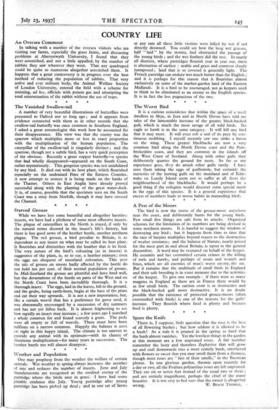Starved Grouse • While we have lost some beautiful and
altogether harmless insects, we have had a plethora of some most offensive insects. The plague of caterpillars in the North is stayed, if only by the natural terms decreed in the insect's life's history, but there is less good news of the heather beetle, another northern plague. The red grouse, a bird peculiar. to Britain, is as dependent as any insect on what may be called-its host plant. It flourishes and diminishes with the heather that is its food. The very nature of the bird's colouring (as in insects) is suggestive of the plant,,is, so to , say, a heather mixture; even the eggs are eloquent of moorland , coloration. This year the tale of grouse _on moors badly affected by the beetle do not hold temper cent., of their- normal ,population of grouse. In Mid-Scotland the grouse are plentiful and have bred well, but the devastations of the beetle, on parts of the. West and on the North-. Coast have been :incredibly thorough. It is a thorough insect. The eggs, laid in the leaves, fall to the ground, and the grubs, being earth-born, begin at the base of the plant and eat their way upwards. _ It is not anew importation, but, like a certain weevil that has a preference for gorse seed, it was abnormally - encouraged by a succession of dry summers and has not yet fallen back. It is almost frightening to see how rapidly an insect may increase ; a few years ago I searched a whole common, for, and found scarcely a grain. The pods were all empty or full of weevils. There must have been millions on a narrow common. Happily the balance is soon :.‘t right in this happy island,. The climate is too uneven to provide any animal with its optimum—with its chance of disastrous multiplication—for many years in succession. The heather beetle too will almost disappear.
- * * * *






























































 Previous page
Previous page